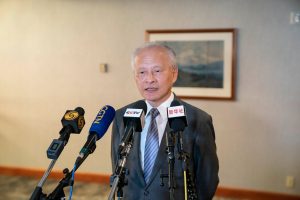China’s ambassador to the United States, Cui Tiankai, officially announced his departure from the post in a letter posted to the Chinese Embassy website on June 21. Cui’s departure had long been rumored, but now it’s official: For the first time since April 2013, China will have a new top representative to the United States.
Since the normalization of relations in 1979, no other Chinese ambassador to the U.S. has served even five years, with three to four years being a typical posting length. Cui’s eight-plus years were a testament to his capability – but also to the turmoil that plagued China-U.S. relations around the time he would have been expected to move on. Cui was four years into his posting in early 2017, right as Beijing was scrambling to make sense of the new Trump administration in the United States.
As Josh Rogin’s book “Chaos Under Heaven” chronicles, Cui was a critical part of Beijing’s efforts to recover from the surprise of Trump’s election victory in November 2016. He worked to open a channel of communication with Donald Trump’s son-in-law, Jared Kushner, after Trump’s win. That incapsulates Cui’s stint as ambassador: low profile, for the most part, but active behind the scenes. While his efforts to engage the Trump administration had decidedly mixed results in the end, Beijing valued Cui enough to keep him in Washington for an unprecedented eight years, through the end of the Trump administration.
With a new U.S. president installed, there are few signs China-U.S. relations will be taking a marked turn for the better. But the standard trappings of diplomacy and channels of communication have been reopened, at least. And with the Biden administration itself set to swap in a new U.S. ambassador to China – widely reported to be Nicholas Burns – Beijing took advantage of the chance to institute its own change.
A distinction is often drawn between Cui and China’s more forward-leaning “wolf warriors.” Cui has disparaged some of the more over-the-top comments by his counterparts, including when he famously denounced an attempt to seed suspicions that COVID-19 might have originated in a U.S. lab as “crazy.” But while Cui refused to engage in the sort of outright name-calling and threats indulged in by some of his fellow ambassadors, that shouldn’t be taken as an indication that he was somehow less staunch in defending Chinese interests. True to the party line, he never budged on China’s “core issues” like Xinjiang, Hong Kong, Taiwan, or the South China Sea. One former Canadian ambassador to China characterized Cui as “no wolf warrior, but far more formidable”: “Calm but unbending, relentless, a smarter, quieter wolf.”
While the official announcement has not been made yet, it’s been widely reported that Qin Gang, a former Chinese Foreign Ministry spokesperson and currently vice foreign minister, will replace Cui. Qin has expertise on Europe rather than the United States, but perhaps more importantly he is seen as close to President Xi Jinping, serving as Xi’s chief protocol officer from 2014 to 2018. As The Diplomat’s Eleanor Albert noted previously, in that capacity “Qin has accompanied Xi on numerous overseas visits and has overseen schedules and itineraries.”
Ultimately, for a high-profile posting like the United States, policy is being formulated directly in Beijing at the top levels. The change in ambassadors won’t have a direct impact on China’s approach to the United States. But other Chinese ambassadors have shown the role still has clout – mostly by damaging China’s image through inflammatory remarks. The biggest question now is whether Qin will follow in Cui’s footsteps and adopt a relatively low-profile approach, or whether he will seek to become a household name, both at home and abroad, for slings and arrows aimed at his host country.

































